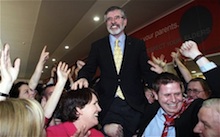
Predictions of a political transformation in Ireland came to fruition on Friday, when in the space of fifteen hours of polling, angry voters eviscerated the Fianna Fail and Green parties.
The unprecedented collapse in the Fianna Fail vote and the complete destruction of the Green Party saw voters flock to the opposition parties and a number of independents.
Sinn Fein saw the most dramatic increase in representation, going from four TDs in 2007 to 14 in the new Dublin parliament.
However, despite a huge swing to the parties of the left, it is the right-wing Fine Gael party which is in position to form a government. Short of an overall majority, it has already begun talks with the left-of-centre Labour Party as well as seeking the support of right-wing independents.
Fianna Fail, which last week had 72 TDs, will limp back to Leinster House next week with just 20 crestfallen deputies.
The party was almost completely wiped out in Dublin, with just Finance Minister Brian Lenihan clinging on to a seat. There are now Fianna Fail-free constituencies all over the country.
After holding power for nearly 60 of the past 80 years, the increasing levels of of croneyism and corruption within the organisation were sharply exposed by the banking crisis. The election produced an inevitable result, and the very future of the party is in doubt.
One of the biggest changes is the fact that the new Dail includes no member of the Haughey or Lemass families.
The Lenihans had three representatives in the outgoing Dail but this has been reduced to one. The two Andrews, Barry and Chris, are both gone.
The ousting of Tanaiste and Minister for Education Mary Coughlan, and Minister for Tourism Mary Hanafin mark the the end of two other Fianna Fail dynasties.
Among the many other big names to tumble were John O’Donoghue, Pat Carey, Dick Roche, Martin Mansergh and Frank Fahey.
In Dublin the left parties -- Labour, the United Left Alliance and Sinn Fein -- now hold a clear majority of 26 seats for the first time.
But fears are mounting that a lust for power will see the Labour Party propping up a right-wing government.
Talks between the Fine Gael and Labour negotiating teams are currently underway at Government Buildings.
Calling on the party to lead a “game-changing” opposition coalition of the left, the UNITE trade union said voters did not vote for a Fine Gael majority.
“Their [Fine Gael’s] policies on privatisation, austerity and income cuts did not attract enough support, and should not now be facilitated by the tired old fallback of coalition with Labour,” said UNITE regional secretary Jimmy Kelly
Mr Kelly said the Labour Party had “an historic opportunity” to lead “a greatly expanded” left-wing coalition.
He said an opposition led by Labour with the support of Sinn Fein, the United Left Alliance and other Independents would have 60 seats in the new Dail.
Both Labour and Fine Gael have said that the process of forming a coalition could be concluded before the weekend.
Asked about the statement from the Unite union, Labour leader Eamon Gilmore said only: “I thank them for their advice.”
![[Irish Republican News]](https://republican-news.org/graphics/title_gifs/rn.gif)
![[Irish Republican News]](https://republican-news.org/graphics/title_gifs/harp.gif)

